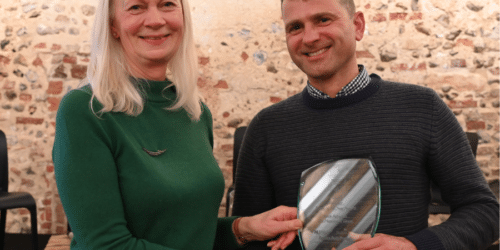
Preti Taneja’s award-winning novella will be brought to life in the grounds of Norwich Castle as a three-part live story at the Norfolk & Norwich Festival. Here, she describes the themes explored within the story and how they are very much a reflection on the experiences of women across the globe today.
Kumkum Malhotra was written as an experiment; I wanted to see if I could trap an emotion between lines. I don’t know if there is a word for it in English, Hindi, Punjabi or Urdu– I feel it as a mixture of grief and rage, resistance and love. It is there as an aftertaste to shame. It is bound up in wanting to be in the world as it is prescribed to us – believing it will bring safety, material rewards and even a kind of happiness – but also, wanting to say ‘no’ to the compromises that might bring – forcefully, silently, just for oneself – because not everyone has the platform, or the sense of themselves to believe their resistance will be heard. If the word for that emotion, that silent ‘no’ does exist, I think it would be a feminine one. In the sense of a feminine ending, or declension. And it would never have had to be reclaimed from any kind of derogatory use.
The writing workshop’s most basic rule is ‘show don’t tell.’ Ironically, it’s a command – literally telling not showing something about the writing process. Students struggle with it: it’s difficult to reverse the deeply internalised idea that being articulate in a certain way is required if you want to get on. But ‘show don’t tell’ is trying to remind us to think back to a state of mind: before we learned how to speak in sentences, when the words that came from us were no more than the facts of what we could see, how things sounded, what they made us feel. Writing as the memory of pre-socialised language. Without a word in my mouth for that emotion, writing it out through women’s lives was the only thing I could do.
Millions of women and girls remain at risk worldwide, silenced even when extreme things happen.
I think Kumkum expresses that doubled ‘no’ best when she, eavesdropping on her husband Shalu, and Anya, the young Western woman who is renting a room in their home in New Delhi, realises her own culpability for what has happened to her life. In that moment, Kumkum understands for the first time, that this is her life, and she realises she does not have to stay in it. She presses her hands to the walls on either side of her. She pushes them away as if she could bring the house down. And then she disappears from her own story.
Until that point, Kumkum’s sense of self has been unravelling, slowly, thread by thread. Trying to protect her little niece one hot summer night, a shocking moment brings her into confrontation with mortality. Then Kumkum seems to break a social code; traumatic misunderstandings follow, loss heaps upon loss, while Kumkum never speaks about any of it, or for herself. Perhaps she thinks she deserves everything that happens to her – that is part of her story, too. Until she decides: enough.
In the age of #MeToo and #TimesUp, it might seem difficult, even counterintuitive or unnecessarily negative to imagine the life of someone who loses her bearings while simply trying to do her best, according to the rules of the society she lives in. After all, these are the same rules that enable powerful abusers to rape and harass, perhaps in a family, perhaps across an industry or profession, until a brave person speaks out. Long running activism in India continues to challenge a rule of law that denies there can be rape within marriage. And cases of rape spark protests year on year, because we must never stop speaking out about it. Yet millions of women and girls remain at risk worldwide, silenced even when extreme things happen, even if they don’t.
The ingrained violence of the every day is pernicious and subtle: it wears a person down. Kumkum is married into a modest middle class family, which brings some social status and the possibility of economic advancement. Her children have opportunities not available to those born into lower castes. Still, she does not speak. She does not believe she can, even for herself. Her own milieu is circumscribed in particular ways. She is the young wife of a man who believes the world owes him something, in a family where material wealth is a weapon.
Sometimes, to save ourselves, we long to disappear.
Kumkum’s silence might be a form of shame or misplaced guilt. However, I think it might also be her strongest defence. It seems submissive but it is an act of survival. Perhaps she feels that only her silence can protect her inner self, and the belief that she was in the right, and that she is loved, if only by herself. Silence protects her memories of being unmarried, and then of being with her children. Once spoken, they would be subject to the laws of entropy, relentless as the dust motes that collect in her house.
Even today, despite social media, local campaigns and global protests, I don’t believe that Kumkum is alone in her silence. I think there are many who don’t speak – even to themselves – about the things they are made to feel ashamed of, or feel guilty about. Nor do they tell of ways they resist. They live in middle class households and working class ones, in wealthy families and among those who have the least. They know that sometimes, to save ourselves, we long to disappear. Not metaphorically, but actually disappear before the world we are in erases us while we are still standing there, folding laundry, cooking dinner, putting on makeup, scrolling online, going to work, going to the cinema, going to a gig, to the gym, to bed.
I am not the first writer to try to give shape to the silent ‘no’ – the emotion that drives this. One of the finest chronicles of it in the Indian context is Anita Desai, whose classic novel, Clear Light of Day intimately focuses on a woman surrounded by her precious family objects as the country changes around her. Another is Mridula Koshy, whose collection of precisely observed short stories, If It Is Sweet I was reading around the same time as writing Kumkum. Michael Cunningham captures it movingly in The Hours, which is inspired by Virginia Woolf’s Mrs Dalloway. Perhaps Anna Karenina would recognise it, and Shakespeare’s Cordelia, the ‘good’ daughter from King Lear. Ginny, the narrator of Jane Smiley’s A Thousand Acres, which is based on the play, knows it – by the end of her story she dissolves herself into a new life that is the opposite of the American dream. And I think the mood captured by the nameless narrator of Flights, by Olga Tokarczuk, translated by Jennifer Croft, expresses it almost perfectly – it’s there in the fragments and vignettes of travel, the counter-metaphor of embalming, perhaps even in the act of translation itself.
The voices that rise against subjugation often do precipitate real social change. For the quiet ones among us, expressing that emotion comes more slowly. Sometimes fiction can propel it, since the compact between book and reader is such a private, intense one. Perhaps there is an ending in which Anna Karenina did not jump, and in which she did not stay with Vronsky, but simply disappeared. I think there is one in which the three sisters of King Lear, Goneril, Regan and Cordelia found a way to take each other by the hand and survive. I think there is one in which Jane Eyre and ‘Bertha’ Mason became allies, and burned Thornfield Hall down, then lived as neighbours with mutual respect. Perhaps Kumkum and Anya find a way to do the same. The futures we can imagine are changed forever if the writer has done their job.
By the end of Kumkum Malhotra, Kumkum’s daughter Nunni is about to be married. She stands with her cousin Madhu for a second, both of them held by the shared memory of a certain hot night in Nizamuddin, when they were young. Then Nunni takes the beaten path. We need those who will raise their voices in fiction, as in life. Though she doesn’t speak in that moment, I think Madhu might be the kind of woman who will, one day. And the world she cannot articulate yet is coming. I think it is on its way now, faster than before. But until it arrives, there will always be the quiet ones, like Kumkum and Nunni, living by the rules, moving towards the moment when they will bring the walls down, and go.
Kumkum Malhotra: A Live Story will be performed as part of the Norfolk & Norwich Festival on Saturday 12 May.
Co-commissioned and co-produced by Norfolk & Norwich Festival and Writers’ Centre Norwich in collaboration with Story Machine Productions.
You may also like...
‘The Meaning of Geese’ wins East Anglian Book of the Year 2023
The debut book from Norfolk conservationist Nick Acheson is crowned the overall winner of the East Anglian Book Awards

16th February 2024
Announcing the category winners for the 2023 East Anglian Book Awards
Discover the six winning titles for the East Anglian Book Awards 2023

18th January 2024






